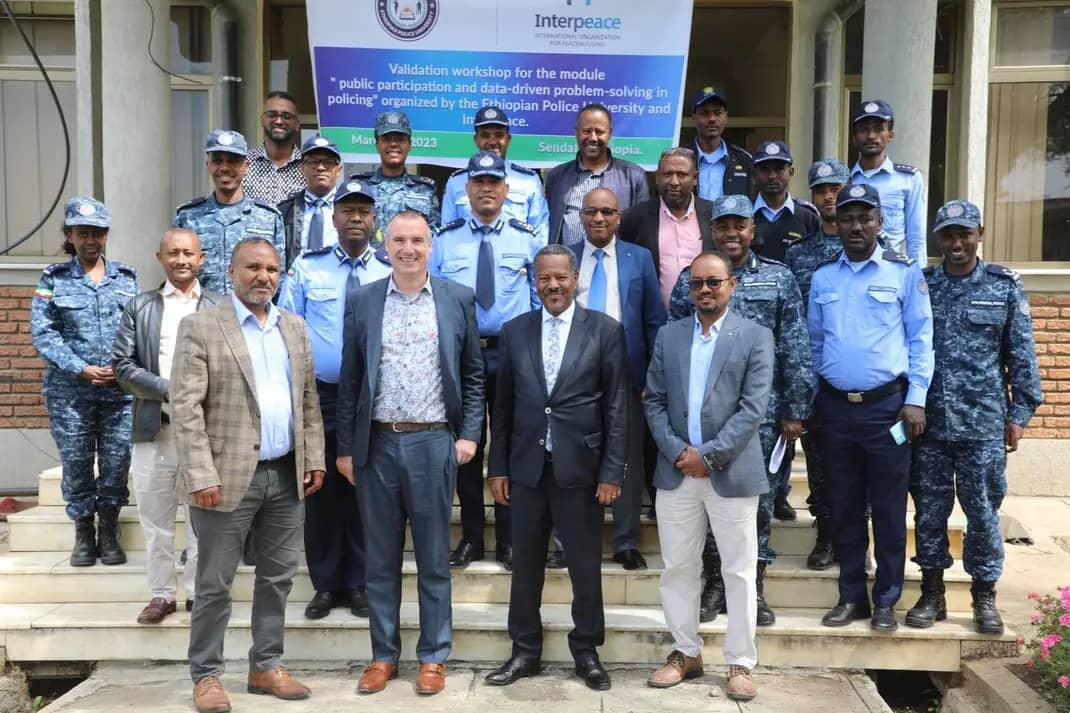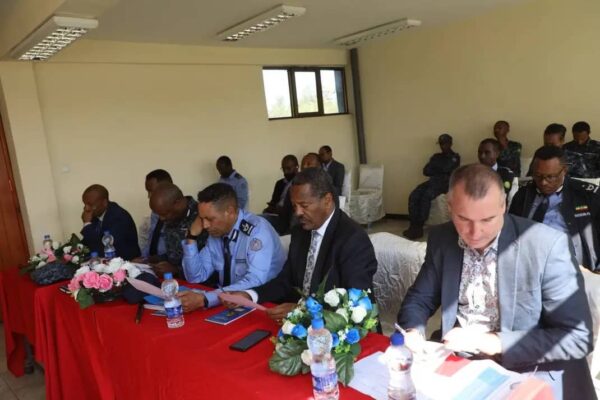Ethiopian police service takes another crucial step towards inclusivity and effectiveness in community engagement

"The validation workshop for the 'public participation and data-driven problem-solving in policing' curriculum marks a crucial step in advancing the Ethiopian police service through the training set by the Ethiopian Police University (EPU.) This workshop empowers our trainees with the knowledge and skills to effectively engage the public in identifying community problems and then devise and implement solutions to those issues. By recognising the importance of collaborative problem-solving, we enhance community-police relations and ensure the safety of our citizens."Tamru*, a senior lecturer and trainer in police science at the EPU.
In a significant stride towards improving the police service and fostering collaboration, the Ethiopian Police University (EPU) and Interpeace signed a comprehensive memorandum of understanding (MoU). As part of this partnership, a team of experts from both organisations developed a module "public participation and data-driven problem-solving in policing" on collaborative problem-solving that will be integrated into EPU's training programmes. This will equip police officers with the necessary skills to work collaboratively with communities and other stakeholders to solve complex problems. Recently, a validation workshop gathered 25 key stakeholders, including the president and vice president of EPU, academicians, and researchers, to assess the content and relevance of the curriculum, marking a crucial step towards transforming community-police relations and enhancing public safety.

Addressing historical gaps in fostering positive interactions between the community and the police
The Ethiopian police service has faced persistent challenges in effectively engaging the public and fostering their active and meaningful participation due to a history of mutual mistrust and hostility. The prevailing perception of the police as the sole entity responsible for addressing crime has hindered the integration of citizens' voices. Consequently, problem definition and priority-setting activities were exclusively carried out by the police department, while systematic approaches to analysing crime and safety-related concerns were limited or non-existent. Recognising the pressing need for change, the EPU, in partnership with Interpeace, endeavoured to bridge this historical gap by developing a pioneering curriculum module.
Collaborative problem-solving approach
The curriculum module focuses on collaborative problem-solving, incorporating data-driven methodologies, and leveraging Geographic Information System (GIS) technology. It equips police trainees with tools and knowledge to effectively engage with the public. Active community participation enables a broader perspective, addresses diverse community needs, and co-creates solutions to crime and safety challenges. This innovative approach heralds a new era of community-oriented policing in Ethiopia.
Significance of the validation workshop
The validation workshop served two key objectives. Firstly, it addressed the need for more technology-based collaborative problem-solving approaches in police training programmes. By integrating this module into EPU's curriculum, future police officers will be equipped with essential skills and knowledge for data-driven and participatory community engagement. Secondly, the workshop evaluated the module's content and relevance within the Ethiopian context, ensuring it meets the unique needs of communities and the police department.
Tamru*, a senior lecturer and trainer in police science at the EPU, emphasised the importance of integrating technology-based collaborative problem-solving approaches into training and education programmes. He views the validation workshop as a significant milestone, stating:
"This initiative is of utmost importance and timeliness in transforming our police service. It is widely acknowledged that the police alone cannot address all crime and safety-related concerns. However, I have observed significant challenges in fostering active public engagement in maintaining peace across different levels. This stems from the inadequacy of our current police education and training schemes to equip trainees with the necessary and up-to-date knowledge of collaborative problem-solving activities. Hence, this curriculum will be critical in helping our trainees realise the importance of engaging the public in effectively addressing crime and safety-related concerns.”
The validation workshop for the "public participation and data-driven problem-solving in policing" module is a defining moment for the Ethiopian police service. It showcases the commitment of the EPU to revolutionise police training, promote community engagement, and foster a safer society. Policymakers, police leadership, and donors must provide unwavering support for successful implementation of the trust-building community policing programme in Ethiopia. By embracing data-driven problem-solving and public participation, Ethiopia paves the way for a more inclusive, effective, and community-oriented police service.
*Names have been changed to protect the subjects’ identities.


